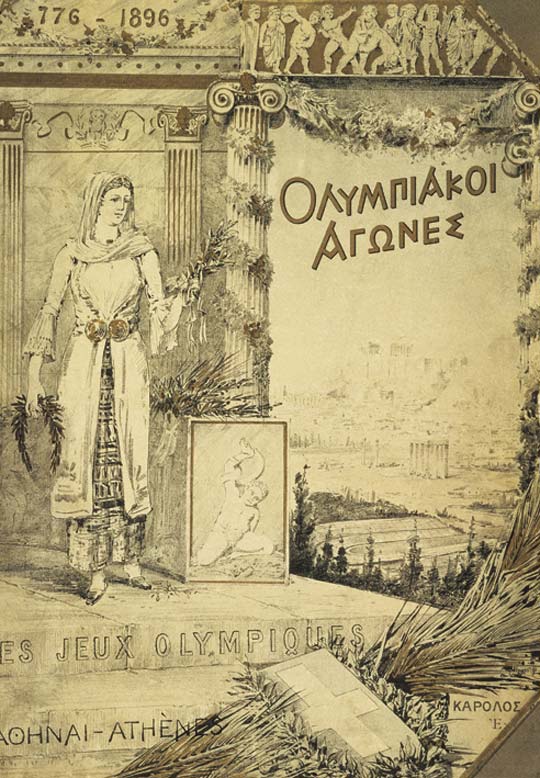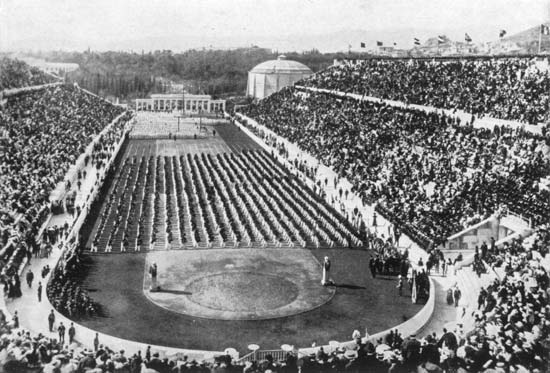
In 1896 located in Athens, Greece, the first modern Summer Olympics took place between April 6-15th. Fourteen nations participated with 241 athletes overall in 43 different events. The Olympic games had the largest number of international participants of any sporting event held before. It was a huge success, and plans quickly began for the 1900 olympics. Since then, every four years the Summer Olympics are held.
Many small sporting events during the nineteenth century were held across Europe and named for the Ancient Olympic Games. In 1870, the Zappas Olympics were held in Athens at the Panathenaic Stadium and attracted over 30,000 people in the audience. Dr. William Penny Brookes had the idea that they hold a minti-national and multi-sport event compared to the ancient olympic games that only three men from Greece were allowed to compete in. Pierre de Coubertin, who is now considered as the father of the modern Olympic games, adopted Brookes’ pan. Coubertin wrote an article about the significance of the 1950 Wenlock Olympian Games held in Wenlock. These games had multiple sports and competitors. He was also inspired by the games Evangelis Zappas had organized previously.
A congress was organized by Coubertin on June 18, 1894 in Sorbonne, Paris. There, representatives from eleven nations met with him so he could present and discuss his plans for olympic games. When the congress accepted his proposal, they worked on setting a date. Originally, Coubertin had wanted to set the date for 1900 when the Universal Exposition of Paris was to be held. Instead they decided in 1896 because they thought that waiting six years might lessen the public’s interest of the games. Once they had set a date, the congress had to come up with a host city. Coubertin suggested Greece after they had discussed a few other options, London being one of them. But, because the olympics originated in Greece, the congress unanimously decided to hold it in Athens. The International Olympic Committee was established during the same congress with Demetrios Vikelas as the 1st president.
News quickly began spreading about the 1896 Olympic Games in Greece and was well received by the public, along with the Greek royal family. Greece was, however, in a political turmoil with the job of prime minister constantly changing between Charilaos Trikoupis and Theodoros Deligiannis. The country was also not very financially stable and did not have the money to host the Olympic games that soon. Stephanos Skouloudis, a member of the organizing committee, had come up with a report that the games would end up costing over three times the amount Coubertin originally estimated, 3,740,000 gold drachmas. From this, they came to the conclusion that they would be unable to hold the Olympics.
Coubertin and Vikelas were determined to make the olympics happens and began a campaign to keep them going. It was announced on January 7, 1897 by Vikelas that crown prince Constantine would be new president of the organizing committee. Constantine’s first job was to raise enough funds for the games, and he was able to do so because his people’s patriotism was motivating them to raise enough money. He was very enthusiastic about the games, only helping him more to raise the money needed. 333,000 drachmas were first raised then 400,000 more were from special stamps sold to raise money and then they got 200,000 more from selling tickets. George Averoff, a businessman, donated 920,000 drachmas to go towards restoring the Panathenaic Stadium. A statue of Averoff was constructed in 1896 for his generous donation and is still standing today right outside the stadium.
In 1932, the first Olympic Village was used, and up until then, athletes had to come up with their own lodging. Many athletes that participated in the first games were already in Athens, which was the main reason as to why they did. Previously in 1894, it was voted on by the IOC that amateur athletes would only be allowed to participate. Fencing was the only event in these games that was not held under amateur regulations. Female athletes were also not allowed to compete because they believed it would not be interesting or aesthetically pleasing, among other things. Prince George of Greece and Denmark acted as referee.
There were six different venues, all for different events. The Panathenaic Stadium was where athletics, gymnastics, weightlifting, and wrestling took place. Swimming was held at the Bay of Zea while tennis was at the Athens Lawn Tennis Club. Cycling was at the Neo Phaliron Velodrome while Fencing was located at the Zappeion. Shooting took place at a shooting range in Kallithea.
The sports included were athletics (12 events), cycling (6), fencing (3), gymnastics (8), shooting (5), swimming (4), tennis (2), weightlifting (2), and wrestling (1). Overall, there were forty-three events. Sailing was originally supposed to be a sport in the games, but ended up getting canceled. Fencing was the only event that allowed professional athletes and amateurs.
Australia, Austria, Bulgaria, Chile, Denmark, France, Germany, Great Britain, Greece, Hungary, Italy, Sweden, Switzerland, and the United States all participated. Greece had the most athletes with 169 total, while a few only had one competitor. Greece also had the most medals, ten gold, seventeen silver, and nineteen bronze, totaling up to forty-six. The U.S. had the second most and the most gold, eleven gold, seven silver, and two bronze, amounting to twenty medals. Two countries, Chile and Sweden, each had one athlete and were the only two to not win a single medal.

On April 6, 1896, the opening ceremony officially opened the games. That same day happened to be the anniversary of Greece’s independence and the Western and Eastern Christian Churches’ Easter Monday. About 80,000 people gathered at the Panathenaic Stadium for the opening ceremony. King George I was also in attendance with his wife and sons, but not his daughters. Constantine, the crown prince, gave a speech as president of the organizing committee. King George I officially opened the games once his son was done speaking. Majority of the athletes were put into groups depending on their nation and were lined up on the infield. Nine bands and 150 choir singers did a performance of the Olympic hymn Spyridon Samaras composed and Kostis Palamas wrote.
On the morning of April 12, 1896, a Sunday. A banquet was organized by King George, despite some competitions that were scheduled after, specifically for athletes and officials. He believed, as stated in his speech, that the Olympics should only be held in Athens.
The closing ceremony was supposed to be held that Tuesday, but was postponed to Wednesday because of rain. The royal family of Greece was in attendance of the ceremony, of course. The Greek national anthem played at the beginning of the ceremony. George S. Robertson, a scholar and athlete from Britain, also performed an ode he had composed entirely in ancient Greek. The King handed out an olive branch, a diploma, and a silver medal to all first place winners, a copper medal, diploma, and laurel branch to second place winners, and those who came in third did not receive a prize or medal. When he finished handing out prizes and medals, the king announced the games were at an end. The crowd cheered while the band played the greek anthem once more after the King exited the stadium.
Coubertin was the one who came up with the idea that they use a different city for every olympics instead of only holding them in Athens like many believed. In 1900, the second olympic Games were held in Paris during the Universal Exposition like he had originally proposed.